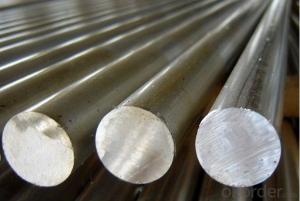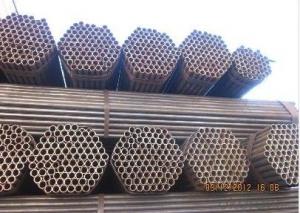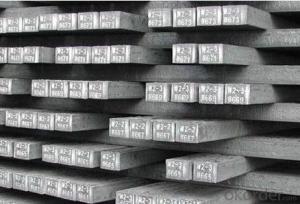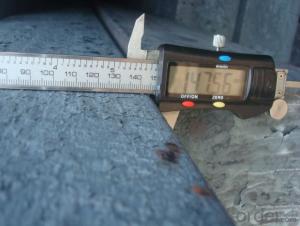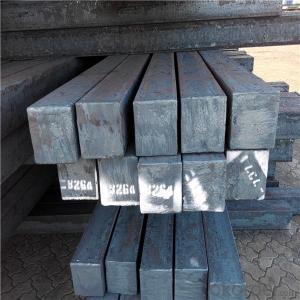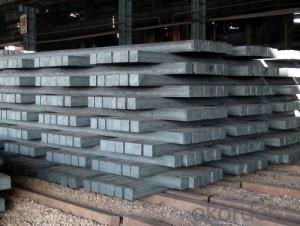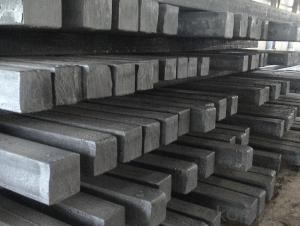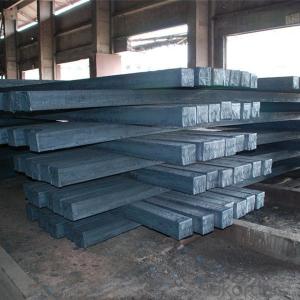Steel Billet Price for 60mm/80mm/100mm/120mm/150mm
- Loading Port:
- Tianjin
- Payment Terms:
- TT or LC
- Min Order Qty:
- 100 m.t.
- Supply Capability:
- 3000 m.t./month
OKorder Service Pledge
OKorder Financial Service
You Might Also Like
Steel Billet Price for 60mm/80mm/100mm/120mm/150mm
Specification for Steel Billet
Grade: mild steel 3sp 4sp 5sp
Dimensions: 100mmx100mm
Standard: AISI, ASTM, BS, DIN, GB, JIS, steel billet
teel billet length:: 3m-12m
billet steel grade:: 3sp 4sp 5sp q235 q195 q255 q275 20mnsi
Main Features for Steel Billet
| Type : | steel billet |
| Steel Grade: | 3sp 5sp q195 q235 q255 q275 20mnsi ,astm a615 gr.60 |
| Size: | 60x60mm-150x150mm |
| Length: | 2m-12m . |
| Processing: | Hot rolled continous cast. |
| Application: | Wire rod , rod , deformed bars , profile steel , mechine parts , and steel mould ect . |
| Packing: | Loose Packing. |
| MOQ: | 1000Tons |
| Delivery Time: | 25days |
| Payment: | T/T , L/C,West Union , Cash . |
| Trade term: | FOB, CFR, CIF ,EXW. |
| Trans term: | FIO ,FILO ,FLT. |
Datas Chart for Steel Billet
Steel billet Steel Grade C(%) Mn(%) Si(%) P(%) S(%) Q235 ≤0.20 ≤1.40 ≤0.35 ≤0.045 ≤0.045 Q275 ≤0.22 ≤1.50 ≤0.35 ≤0.045 ≤0.045 20MnSi 0.17-0.25 1.20-1.60 0.40-0.80 ≤0.050 ≤0.050 3SP 0.18-0.22 0.60-0.85 0.05-0.30 ≤ 0.040 ≤0.050 5SP 0.28-0.37 0.80-1.00 0.15-0.30 ≤ 0.040 ≤0.050
FAQ
Q:Why should choose us?
A:Stable quality ----continous casting hot rolled production techenic, strictly quality control system.
Lower price -------Not the cheapest but the lowest price at the same quality .
Good service -----Satisfactory service within 24hours.
Delivery time ------15-25days for the mass production .
Discount---------------discount base on monthly large quantity purchase in long term.
Pictures:
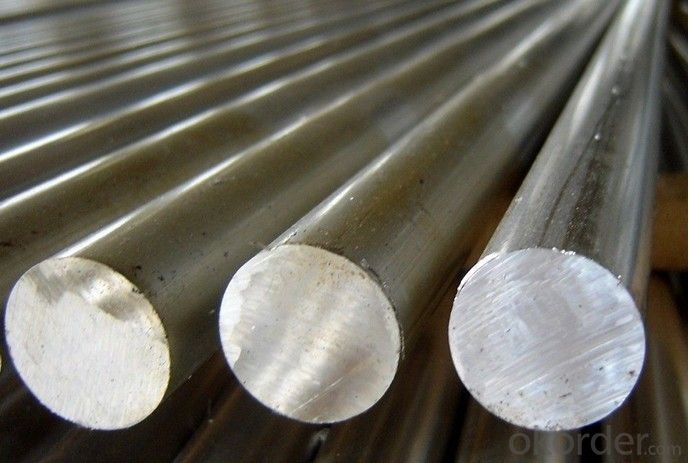
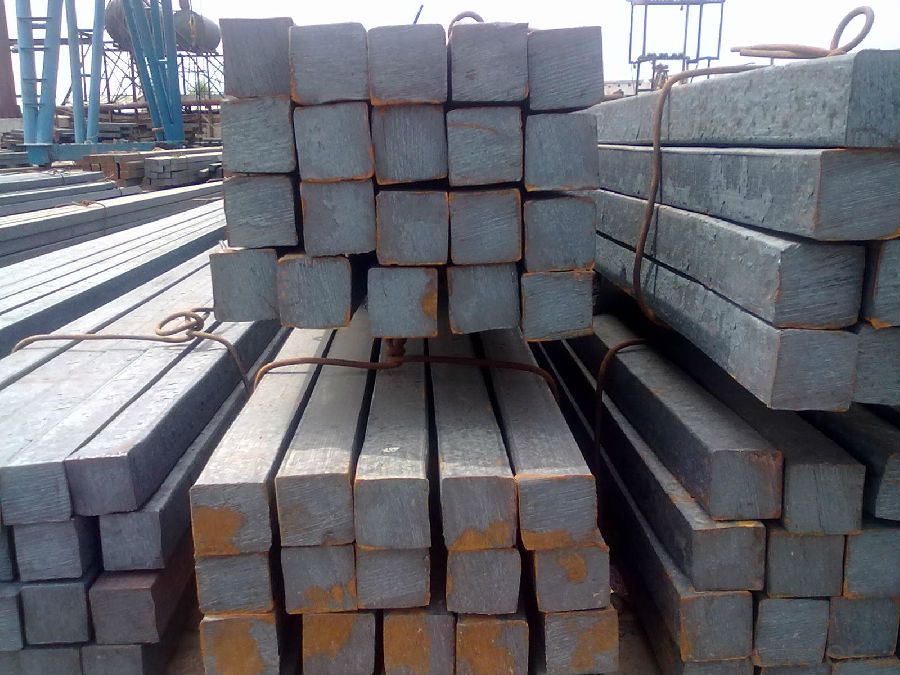
- Q: What is the maximum diameter of steel pipes?
- The maximum diameter of steel pipes can vary depending on the specific needs and requirements of a project. However, steel pipes are commonly available in diameters ranging from 1/8 inch to 72 inches or even larger.
- Q: How are steel pipes used in airport infrastructure?
- Steel pipes are widely used in airport infrastructure for various purposes. They are used for constructing the framework of airport terminals, hangars, and other buildings. Steel pipes are also used for the installation of HVAC systems, electrical wiring, and plumbing in airport facilities. Additionally, steel pipes are used for the construction of runways, taxiways, and aprons, providing a strong and durable foundation for aircraft operations.
- Q: What is the typical diameter range for steel pipes?
- The typical diameter range for steel pipes varies, but it typically falls between 1/2 inch to 48 inches.
- Q: What are the different shapes available for steel pipes?
- There are several different shapes available for steel pipes, including round, square, rectangular, and oval.
- Q: What are the different types of joints used with steel pipes?
- There are several types of joints used with steel pipes, including threaded joints, welded joints, flanged joints, and grooved joints.
- Q: How are steel pipes used in the manufacturing of food processing machinery and equipment?
- Steel pipes are commonly used in the manufacturing of food processing machinery and equipment due to their durability, corrosion resistance, and high strength. These pipes are used for various purposes such as fluid transportation, steam generation, and structural support in the machinery. They are also crucial for conveying liquids, gases, and other food ingredients safely and hygienically throughout the manufacturing process. Additionally, steel pipes can withstand high temperatures and pressures, making them ideal for applications like sterilization, pasteurization, and cooking in food processing machinery.
- Q: What are the uses of welded steel pipes?
- Straight seam welded steel pipe (YB242-63) is a steel pipe whose welding seam is parallel to the steel tube. Usually divided into metric welded steel pipe, welded thin-walled pipe, transformer, cooling tubing, and so on.
- Q: What is the bending strength of steel pipes?
- Steel pipes have the ability to withstand bending forces without breaking or permanently deforming, which is known as their bending strength. This strength can vary depending on factors like the type of steel, the grade of steel, the diameter and thickness of the pipe, and the manufacturing process. Steel pipes are highly durable and strong, making them suitable for many different uses. The bending strength of steel pipes is typically measured by the maximum bending moment or stress that the pipe can handle without failing. Engineers and manufacturers determine the bending strength of steel pipes using various testing methods, such as three-point or four-point bending tests. These tests involve applying a known force or moment to the pipe and measuring its deflection or stress response. The bending strength of steel pipes can also be affected by mechanical properties like yield strength, tensile strength, and elongation. These properties determine the overall strength and ductility of the steel, which are crucial for its bending strength. It's important to note that the bending strength can vary depending on the specific application and the load conditions. For instance, pipes used in structural or load-bearing applications may require higher bending strength than pipes used for plumbing or conveyance purposes. In conclusion, the bending strength of steel pipes is determined by factors such as the type of steel, the grade of steel, the diameter and thickness of the pipe, and the manufacturing process. Testing methods and mechanical properties are used to assess the bending strength of steel pipes, ensuring they are suitable for different uses and load conditions.
- Q: How to make the steel pipe spray paint is not easy to fall off?
- First you will rust steel, to clean, good quality alkyd rustproof paint, completely dry after brushing paint, color to see his kind of love.
- Q: Can steel pipes be used for oil refineries?
- Yes, steel pipes can be used for oil refineries. Steel pipes are commonly used in oil refineries due to their durability, high strength, and resistance to corrosion, making them suitable for transporting crude oil and refined products under high pressure and harsh conditions.
Send your message to us
Steel Billet Price for 60mm/80mm/100mm/120mm/150mm
- Loading Port:
- Tianjin
- Payment Terms:
- TT or LC
- Min Order Qty:
- 100 m.t.
- Supply Capability:
- 3000 m.t./month
OKorder Service Pledge
OKorder Financial Service
Similar products
Hot products
Hot Searches
Related keywords
